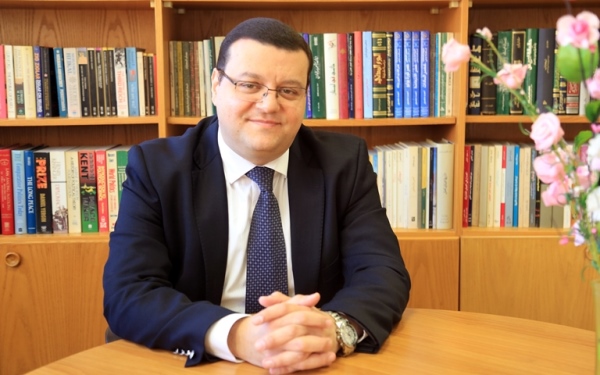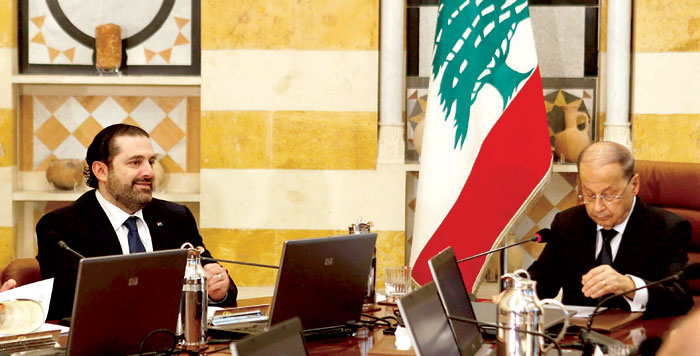Lebanon: Will the momentum be squandered?
Rami Rayess / The Arab Weekly
7 يناير 2017

After two-and-a-half years of presidential vacuum, the Lebanese parliament succeeded in electing a new president, former army commander Michel Aoun, who was practically refused by all parliamentary blocs only weeks before going to the ballot.
Regardless of the reasons or circumstances that stand behind this election, the new president attempted to send positive signals in all directions. His inaugural address was meticulously written and applauded by almost all parties in the long-divided political society.
He received envoys from Syria, Iran, Saudi Arabia, Qatar and Egypt and promised to pay his first visit as president to Riyadh. Aoun said Lebanese-Arab relations would return to their previous status of friendliness, expecting come back of Gulf citizens to Beirut after lifting the ban imposed last year in an unprecedented deterioration of mutual relations in contemporary history.

However, questions arise as to whether the momentum gained after the presidential election, nominating long-exiled Saad Hariri as prime minister and creating a 30-member cabinet that represented almost all the political parties and gaining parliamentary confidence in less than 48 hours; yet, this momentum is under scrutiny.
Information leaked that Hezbollah would not accept the return of Hariri to the premiership after parliamentary elections was never refuted. Talk about sacrificing to accept his comeback when the regional axis of resistance, with enormous Russian support, is achieving victory, most recently in Aleppo, could not be disregarded, either.
This highly undermines the possibility of accomplishing the long-awaited solutions for accumulating problems, especially in the economy, the ever-growing public debt or the rising challenges in the social demands, health care or otherwise.
Even though there are high expectations from Hariri for the six-month transitory phase, political discussion concentrates on the electoral law amid severe divisions regarding the issue.
Leader of the Democratic Gathering, Walid Jumblatt, warned that he would refuse any attempt to adopt laws that aim at marginalising or shrinking his parliamentary presence, a stance positively met by public and private statements from several leaders, including Hariri, Hezbollah Secretary-General Hassan Nasrallah and parliament Speaker Nabih Berri.
Whether this discussion will be sufficient to reach a new electoral law or have elections based on the 1960 law is not clear. However, there is a lot of talk in Beirut that most political forces refuse that law in public and support it in private.
Though there are increased requests that the proportional representation law be applied, political confessionalism stands in the way of making such an ideal electoral system plausible. The debate over the electoral law might hinder significant development in other fields because it might emerge as a source of tension, deviating attention from secondary issues.
Two-and-a-half years of political paralysis drastically aggravated the economic situation because the former cabinet barely functioned under the pressure from the Free Patriotic Movement and Hezbollah under different titles. Therefore, a lot of work is expected to alleviate public services and regain confidence that has been squandered because of political differences and institutional decay with high rates of corruption in the bureaucracy and public administration.
Whether this is feasible, the coming days are to judge.
 عن أمل جنبلاط المتجدد: لبنان يستحق النضال
عن أمل جنبلاط المتجدد: لبنان يستحق النضال
 صحافيون أم عرّافون!
صحافيون أم عرّافون!
 ماذا يجري داخل أروقة بيت الكتائب المركزي؟
ماذا يجري داخل أروقة بيت الكتائب المركزي؟


 عن الخرائط التي تُرسم والإتفاقات التي تتساقط!
عن الخرائط التي تُرسم والإتفاقات التي تتساقط!
 “الإنحراف في الحياة”/ بقلم كمال جنبلاط
“الإنحراف في الحياة”/ بقلم كمال جنبلاط
 هاشتاغ #صار_الوقت يحل أولاً في حلقة جنبلاط
هاشتاغ #صار_الوقت يحل أولاً في حلقة جنبلاط
 طاولة نقاش عن أزمة الصحافة في جامعة AUST
طاولة نقاش عن أزمة الصحافة في جامعة AUST
 عبدالله: ليظهر لنا وزير مكافحة الفساد حرصه في صفقات البواخر والفيول
عبدالله: ليظهر لنا وزير مكافحة الفساد حرصه في صفقات البواخر والفيول
 عبدالله: غريب أمر وزارة مكافحة الفساد!
عبدالله: غريب أمر وزارة مكافحة الفساد!

 Comment to Uri Avnery: How Sad What Is Looming Ahead
Comment to Uri Avnery: How Sad What Is Looming Ahead
 “Not Enough!”
“Not Enough!”
 … لمن لم يقرأ يوسف البعيني/ بقلم وسام شيّا
… لمن لم يقرأ يوسف البعيني/ بقلم وسام شيّا
 كمال جنبلاط في مولده الأول بعد المائة: تعاليمه وأفكاره ما زالت الحلّ/بقلم عزيز المتني
كمال جنبلاط في مولده الأول بعد المائة: تعاليمه وأفكاره ما زالت الحلّ/بقلم عزيز المتني
 رئيس حزب/ وليس (… سابقاً)/ بقلم د. خليل احمد خليل
رئيس حزب/ وليس (… سابقاً)/ بقلم د. خليل احمد خليل
 التوازن السياسي في لبنان
التوازن السياسي في لبنان
 لبنان… مشاريع انقلابية مؤجلة
لبنان… مشاريع انقلابية مؤجلة
 جنبلاط وحَمَلة أختام الكاوتشوك
جنبلاط وحَمَلة أختام الكاوتشوك
 Le Liban est un symbole de tolérance
Le Liban est un symbole de tolérance
 Our Automated Future
Our Automated Future
 The True Origins of ISIS
The True Origins of ISIS
 Les Misérables vs. Macron
Les Misérables vs. Macron
 عذراً أيها المعلم/ بقلم مهج شعبان
عذراً أيها المعلم/ بقلم مهج شعبان
 رساله الى المعلم / بقلم ابو عاصم
رساله الى المعلم / بقلم ابو عاصم
 إلى روح القائد والمعلم كمال جنبلاط/ بقلم أنور الدبيسي
إلى روح القائد والمعلم كمال جنبلاط/ بقلم أنور الدبيسي
 أسرار وعناوين الصحف ليوم الجمعة 14 كانون الاول 2018
أسرار وعناوين الصحف ليوم الجمعة 14 كانون الاول 2018














